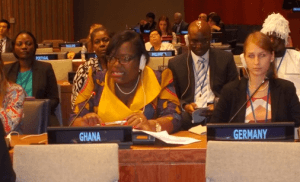Ghana shares national ageing policy with UN

Ghana has shared its ageing policy at the on-going Sixth Session of the Open Ended Working Group on Ageing (OEWGA) at the United Nations, New York.
Nana Oye Lithur, Minister of Gender, Children and Social Protection, who is leading Ghana’s delegation, noted that, the dramatic demographic change in the population of older persons is occurring in the context of globalization and socio-economic challenges, deterioration of cultural values and morals, spreading of HIV/AIDS pandemic and other diseases.
She noted that changes calls for effective and carefully thought out policy interventions to take advantage of the several opportunities that come with it and reduce its negative impact on the development of our country.
The Open-ended Working Group on Ageing for the purpose of strengthening the protection of the human rights of older persons is a UN Programme on Ageing, and forms part of the Division for Social Policy and Development (DSPD), United Nations Department of Economic and Social Affairs (UNDESA).
The OEWGA serve as the focal point within the United Nations system on matters related to ageing with a primary action to facilitate and promote the Madrid International Plan of Action on Ageing.
It also design guidelines for policy development and implementation; advocating means to mainstream ageing issues into development agendas; engaging in dialogue with civil society and the private sector; and information exchange.
Nana Oye Lithur noted that today’s generation owes it as a duty to honour and guarantee better living conditions for our older persons.
“We need to recognize that the society in which we live today has been built, thanks to the efforts and toil of previous generations, some of whom live with us and defined as older persons.
“We must make the effort to provide them with efficient health care services and conducive living environment to ensure that they age actively and with adequate security and recognizable dignity,” she noted.
She said Ghana has also set up a National Advisory Council on Aging (NACA) to facilitate the development of a bill and eventual act on aging.
She said the Council is to provide technical advice to the government and stakeholders for the implementation of key strategies provided for in the policy to promote the rights and freedoms of the ageing in Ghana.
Nana Oye Lithur, the Sector Minister, said the National Advisory Council on Aging (NACA) was a key provision of the National Aging Policy (NAP), which was adopted in 2010 to ensure that the socio-economic and human rights of the aged and aging are protected.
She said the Ministry was facilitating priority access for the aged to hospitals, banks and free bus ride at transport terminals and also establish aged desk at the ministry, which will serve as the first point of call for the aged.
Nana Oye Lithur said NACA would provide technical advice to the government and stakeholders for the implementation of the key strategies provided for the policy to promote the rights and the freedom of the ageing in Ghana.
As part of government’s efforts in improving the conditions of the aged, the gender Minister said a training centre to train Nurses to take care of the aged, and also to encourage doctors to specialize in geriatric, would be set up since there is only one Geriatric specialist in Ghana.
She said the problems of aging were universal, including exclusion, marginalization, degrading treatment, lack of income security, lack of access to health, housing and many other challenges, which deny the state the opportunity to maximize gains from their accumulated wisdom, experiences and expertise, the Gender Minister stated.
“It was for the purpose of addressing these challenges and providing the aged some reasonable access to health, dignity, and continuing contribution to society that the NAP was adopted,” she said.
The 2015 OEWGA is working towards a comprehensive and Integral International Legal Instrument to Promote and Protect the Rights and Dignity of Older Persons.
It will also serve as a platform for presentation of concrete proposals, sharing of practical measures, and best practices which will contribute to promoting and protecting the rights and dignity of older persons.
Source: GNA
